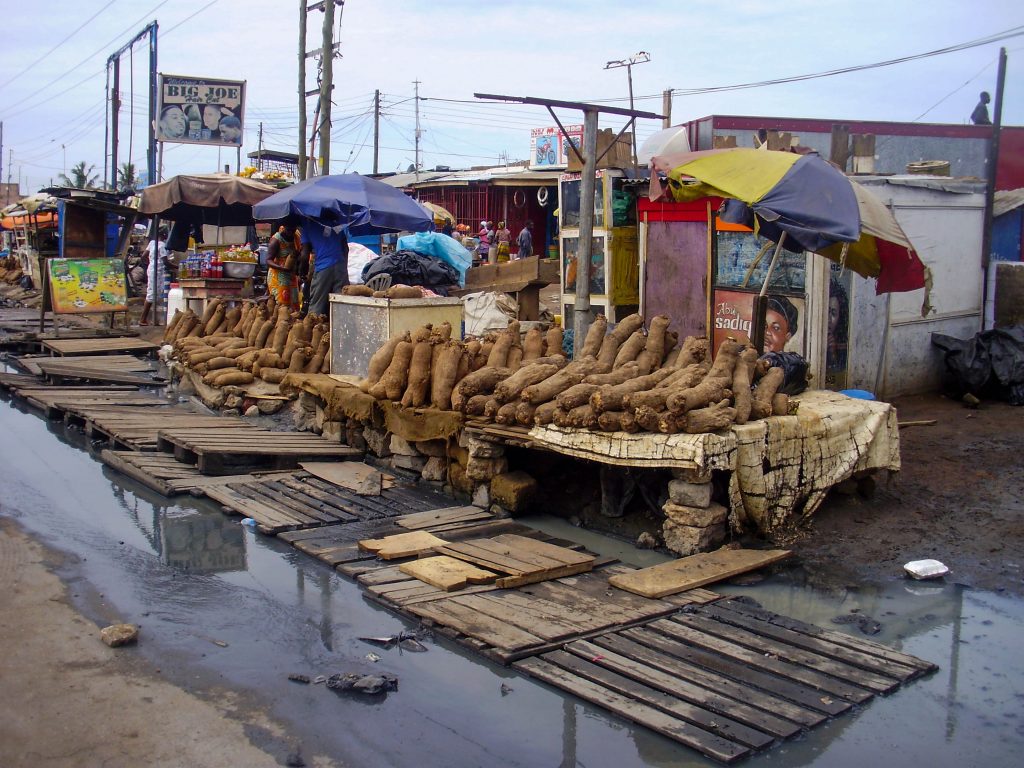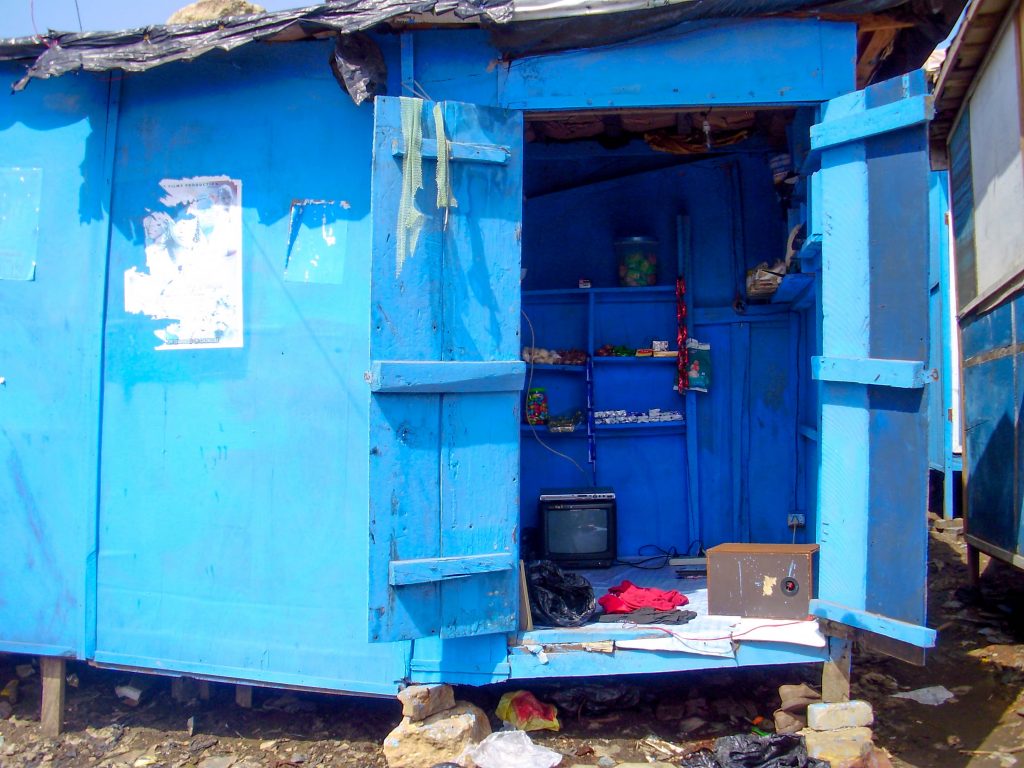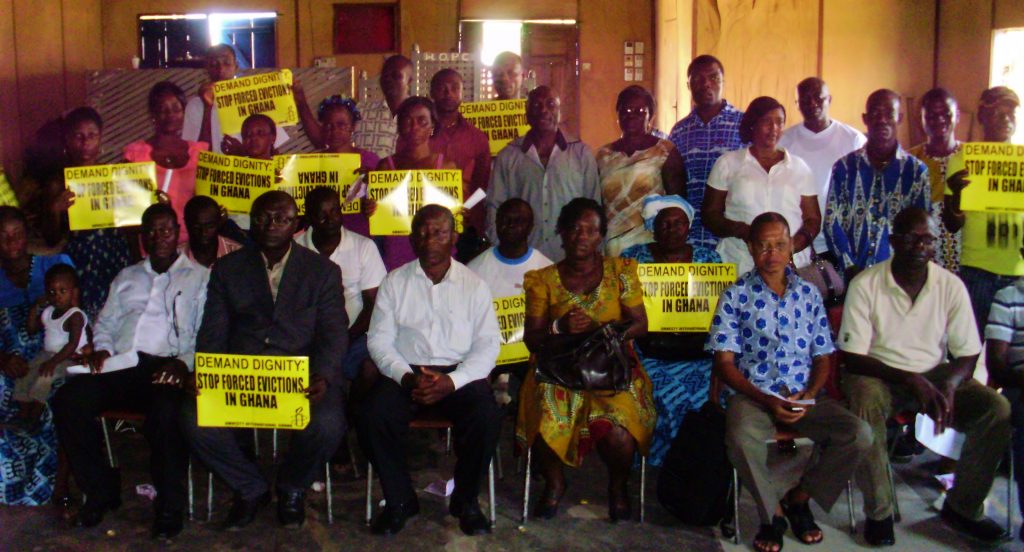Published in: Think Africa Press
Residents of Ghana’s most notorious slum live in shocking conditions. And the government’s threats of eviction are only making things worse.
Accra, Ghana: On the outskirts of Accra, alongside the Odaw River and the Korle Lagoon, lies the slum of Old Fadama. Pejoratively referred to by many Ghanaians as a modern day “Sodom and Gomorrah”, Old Fadama is said to be home to around 80,000 people, making it Ghana’s biggest slum.
Life here can be precarious and opportunities for social mobility are few and far between. Made up of a bustling, roughshod tessellation of closely built wooden structures, up to twenty people sleep on the floors of its individual ‘kiosks’ – each one an average of 3-4m2. Social amenities such as sanitation, running water, medical care and waste collection are hard to come by.
The slum is also home to one of the world’s largest electronic waste dumps, and its inhabitants are largely stigmatised by the rest of Ghanaian society. These constraints are not helped by the government’s negligent and dismissive stance towards them, and they live under the constant threat of eviction.
However, this is not the say that Old Fadama’s residents are passive sufferers in all this. For several years now, they have been resolute in defending their way of life and have refused to move out despite ample government pressure. They have shown agency and organised themselves as communities in forming unions, churches and mosques.
Last June, representatives from Old Fadama joined with counterparts from slums across Ghana to form the Slum Union of Ghana, an organisation allied in its struggle to “fight against forced evictions, advocate the economic, social and cultural rights of slum dwellers, and form a united voice of slum dwellers across the country”.

E-waste not, want not
“Old Fadama developed in the early 1990s during the tribal wars in northern Ghana”, explains Alhassan Abdallah, a resident of Old Fadama since 2005. “The government relocated internal refugees with the intention of repatriating them after the conflict, but it failed in doing this. Instead, the people found employment in the nearby market and engaged themselves in establishing a prospering vegetable market.”
Along with the vegetable market, many residents also rely on the electronic waste dump for a source of income. Originally the result of a charitable initiative to provide Ghana with second hand technology, the scheme has become a way for Western countries to illegally dump unwanted electronic materials.
Old Fadama resident Alhassan Abdallah recalls his memories from when he was a boy and worked in the scrap metal business to pay his own school fees. “We woke up very early every morning and drove a truck around the city looking for scrap metals and broken electronics to buy and then come back to Old Fadama in order to sell them”, he says.
Still today, a large number of the locals – including young boys – earn their daily bread at the e-waste dumpsite by taking apart old electronic devices to sell bits of scrap metal at the nearby Agbogbloshie market. The working conditions are dire. The children do not wear protective clothing and often use tools no more sophisticated than a simple rock to dismantle old computers, TVs, VCRs and so on in the search for small elements of copper and aluminium. Often they burn the devices to melt away the plastic and leave behind the exposed copper wires; the burning however releases toxic fumes, which can damage the eyes and lungs.

Very private schools
Abdallah explains that he managed to complete university, but is aware of his privileged position. Around 65% of children under the age of 18 do not attend school and 49% of the slum dwellers in Old Fadama have no education at all.
Abdallah explains that “because they are so young, growing up in such a hazardous slum lifestyle involving stealing or smoking, without any perspectives for the future, they do not understand their situation. Most of them want to become a doctor, but none of them go to school.”
Indeed, there are very few chances for children in Old Fadama to gain the education that will allow them to leave the slum. There is a distinct lack of public schools in the surrounding area. And children are thus faced with a Hobson’s choice between attending one of three private schools and paying high tuition fees, or finding a school outside the settlement and spending money on travel. Either way, to these costs they must also add the prices of uniforms and books, making both options difficult to afford.
Under threat of eviction
These arrangements may not be ideal but many slum dwellers seem to have found a working equilibrium. What they urgently need is external support.
Yet for over a decade now, they have been threatened with forced evictions. The first eviction notice was served upon residents by the Accra Metropolitan Assembly (AMA) in 2002.
Due to pressure from the UN Habitat’s Advisory Group on Forced Evictions and the People’s Dialogue on Humans Settlements, the Ghanaian government announced in 2006 that it had earmarked 10 million Euros ($13 million) for the relocation of Old Fadama’s residents.
These plans failed to materialise though and even more worryingly, there is evidence that even before this strategy was ready for implementation, both the AMA and the government had renewed their eviction threats – a knock-on effect of elections-related clashes in the community in 2008 and 2009.
These slum dwellers now live in a state of permanent insecurity, which hampers meaningful attempts to improve their living conditions.
“People are afraid to invest their money into activities upgrading the settlement”, explains Philip Kumah, president of the Slum Union of Ghana and a human rights activist who lives and works in Old Fadama. “At any time the bulldozers can drive into the community and demolish the structures, leaving people homeless and poorer than before.”

The struggle continues
Amidst these multiple threats and hazards, Old Fadama’s slum dwellers have been fighting to survive, and in 2012, representatives from Old Fadama joined with their counterparts from slums across the Greater Accra Region to establish the Slum Union of Ghana. The organisation’s main activities entail lobbying the government to end forced evictions and fulfil their responsibilities to slum communities; establish rapid response capability in case of emergencies (evictions, fire outbreaks, and floods); educate slum dwellers on their rights and responsibilities; and attract social amenities to slums. The Slum Union of Ghana cooperates with Amnesty International, engages with the local media, and organises workshops with the representatives of other slum communities.
For the residents of Old Fadama then, the struggle continues – a struggle to live in safety; to live in a clean and healthy environment; to live without the fear of returning home after a long day’s work just to find it destroyed by the forces of a state whose motto is ‘Freedom and Justice’.
Finally, the inhabitants of Old Fadama also have to fight on a front far more difficult to define – that of living in dignity and with pride. Hugely negative stereotypes abound about Old Fadama and its inhabitants, with many seeing its residents as criminals and unemployed. But as resident Bright Dzila explains, “I don’t want my children to be faced with such opinions. What we all want is to live with dignity. This means for me to able to be proud of who I am – a slum dweller.”


